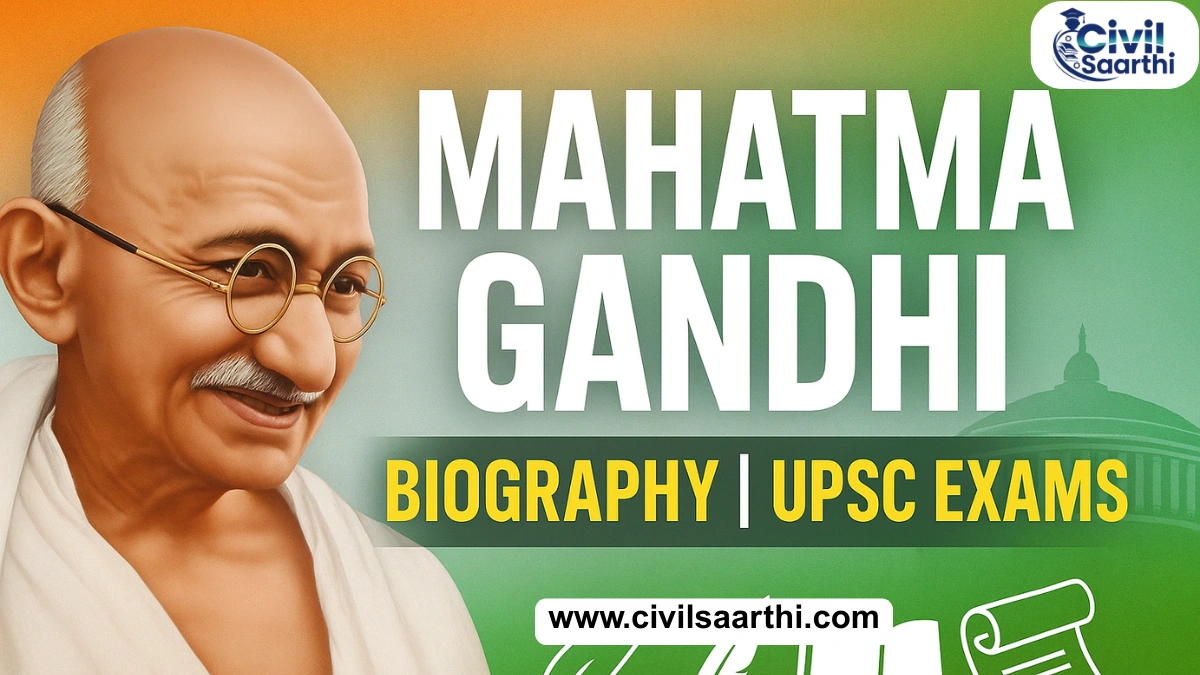Mahatma Gandhi, born as Mohandas Karamchand Gandhi, is revered as the Father of the Nation in India for his unparalleled role in the country’s freedom struggle. He introduced a new form of political resistance based on truth, non-violence, moral courage, and mass participation, which not only weakened British colonial rule but also reshaped political movements across the world. Gandhi’s life is a powerful blend of politics, ethics, spirituality, and social reform, making him a core subject for UPSC and other competitive examinations.
Mahatma Gandhi
Mahatma Gandhi occupies a central position in modern Indian history. Unlike earlier nationalist leaders whose struggle was largely confined to the educated elite, Gandhi transformed the freedom movement into a mass-based national struggle involving peasants, workers, women, and marginalized communities. He proved that non-violent resistance could challenge even a powerful imperial authority, thereby redefining the meaning of political power.
Mahatma Gandhi Early Life
Mahatma Gandhi was born on 2 October 1869 in Porbandar, Gujarat, into a middle-class family deeply rooted in traditional Indian values. His upbringing in a religious and disciplined environment played a crucial role in shaping his lifelong commitment to truth, morality, and non-violence.
- Born as Mohandas Karamchand Gandhi in a Vaishya (trader) family
- Father Karamchand Gandhi served as the Diwan of Porbandar and Rajkot
- Mother Putlibai was deeply religious, influencing Gandhi’s ethical outlook
- Grew up in an atmosphere of tolerance towards different religions
- Early exposure to truthfulness, self-restraint, and compassion
- Married Kasturba Gandhi at a young age, as per the customs of the time
- Childhood marked by simplicity, discipline, and moral sensitivity
- These early influences laid the foundation for his later philosophy of satya (truth) and ahimsa (non-violence)
Education and Formative Years Abroad
Mahatma Gandhi’s education abroad played a decisive role in shaping his intellectual, moral, and political outlook. His experiences in England and South Africa transformed him from a hesitant lawyer into a committed leader guided by truth, justice, and non-violence.
- Legal Education in England (1888–1891): Gandhi went to London in 1888 to study law at the Inner Temple, where he was trained in Western legal principles, constitutionalism, and the idea of rule of law.
- Moral and Intellectual Exposure: During his stay in England, Gandhi came in contact with Western thinkers, Christianity, Theosophy, and liberal ideas, while simultaneously deepening his understanding of Indian scriptures such as the Bhagavad Gita.
- Experiments with Self-Discipline: Gandhi adopted vegetarianism strictly and began lifelong experiments with diet, celibacy, simplicity, and self-control, shaping his ethical outlook.
- Return to India and Early Legal Struggles: After qualifying as a barrister, Gandhi returned to India in 1891 but faced professional difficulties, which made him introspective and humble.
- Journey to South Africa (1893): Gandhi moved to South Africa on a legal assignment, where he encountered systematic racial discrimination against Indians.
- Pietermaritzburg Incident and Political Awakening: Being thrown out of a train despite a valid ticket became a turning point, awakening his resolve to fight injustice through non-violent means.
- Birth of Satyagraha: In South Africa, Gandhi organized the Indian community, led non-violent protests against unjust laws, and evolved the philosophy of Satyagraha, which later became the foundation of India’s freedom struggle.
Mahatma Gandhi in India’s Freedom Struggle
Mahatma Gandhi returned to India in 1915 and soon emerged as the central figure of the national movement by transforming it into a mass-based, non-violent struggle. He connected political freedom with social justice and mobilised peasants, workers, women, and the poor. From Champaran to Independence, Gandhi provided both moral leadership and strategic direction to India’s freedom struggle.
- Champaran Satyagraha (1917): Gandhi led indigo farmers in Bihar against European planters’ exploitation, marking his first successful experiment of satyagraha in India.
- Ahmedabad Mill Strike (1918): Acted as a mediator between mill workers and owners, using fasting as a moral pressure to secure workers’ demands.
- Kheda Satyagraha (1918): Supported peasants in Gujarat seeking tax remission during famine, strengthening peasant-based nationalism.
- Rowlatt Satyagraha (1919): Led nationwide protest against repressive colonial laws, bringing mass participation into the freedom movement.
- Non-Cooperation Movement (1920–22): Called for boycott of British institutions, schools, courts, and titles, making the movement truly national.
- Withdrawal after Chauri Chaura (1922): Suspended the movement to uphold non-violence, reinforcing ethical discipline over political gains.
- Civil Disobedience Movement & Salt March (1930): Led the Dandi March to break the salt law, symbolising resistance and economic self-reliance.
- Gandhi–Irwin Pact (1931): Led to the suspension of the Civil Disobedience Movement and participation in the Round Table Conference.
- Constructive Programme: Promoted khadi, village industries, eradication of untouchability, and communal harmony alongside political struggle.
- Quit India Movement (1942): Issued the call of “Do or Die,” demanding immediate British withdrawal and marking the final mass uprising.
- Role During Partition (1946–47): Worked tirelessly to control communal violence and promote peace despite political setbacks.
- India’s Independence (1947): Though not part of celebrations, Gandhi’s leadership and sacrifices were central to achieving freedom.
Gandhi’s Philosophy and Ideals
Gandhi’s philosophy was a unique blend of ethics, spirituality, and politics, aimed at transforming both the individual and society. His ideals guided India’s freedom struggle and continue to remain relevant for governance, social justice, and ethical leadership.
- Satyagraha (Truth-Force): Gandhi believed that truth has an inherent moral power, and non-violent resistance based on truth could defeat injustice and oppression.
- Ahimsa (Non-Violence): He regarded non-violence as the highest moral virtue, essential not only in action but also in thought and speech.
- Sarvodaya (Welfare of All): Gandhi emphasized inclusive development and the upliftment of the poorest and weakest sections of society.
- Swadeshi: Advocated economic self-reliance through the use of indigenous goods, especially khadi, to reduce dependence on colonial economies.
- Trusteeship: Proposed that wealth should be held in trust by the rich for the benefit of society, ensuring social and economic justice.
- Simple Living, High Thinking: Stressed the importance of simplicity, self-restraint, and ethical conduct in personal and public life.
- Religious Tolerance: Believed in equal respect for all religions and strongly opposed communalism and religious hatred.
Gandhi’s Autobiography
The Gandhi autobiography, The Story of My Experiments with Truth, was written between 1925 and 1929. Unlike a typical autobiography, it is more of a spiritual journey. Gandhi openly shared his mistakes, struggles with truth, experiments with diet, celibacy, and non-violence. For UPSC aspirants, this book is valuable to understand his character and leadership style.
Life Story of Mahatma Gandhi Ji
The Mahatma Gandhi life story is a journey from simplicity to greatness. He started as a timid boy, became a lawyer, then a global leader of non-violence. His dedication to social reforms included fighting against untouchability, promoting women’s participation, and advocating for education and sanitation. Tragically, Gandhi was assassinated on 30 January 1948 by Nathuram Godse. His death shocked the world but his message lived on.
Social Reforms and Contributions of Gandhi Ji
Apart from leading India’s freedom struggle, Gandhi worked extensively on social reforms:
- Abolition of Untouchability – Campaigns like Harijan Sevak Sangh.
- Women Empowerment – Encouraged women’s participation in politics and protests.
- Village Reconstruction – Promoted khadi, rural industries, and self-sufficiency.
- Education – Advocated for Nai Talim (basic education).
- Religious Harmony – Stood against communal violence and promoted unity.
10 Teachings of Mahatma Gandhi
Here are the 10 teachings of Mahatma Gandhi most relevant for UPSC and ethics:
- Truth (Satya): Always align actions with truth.
- Non-Violence (Ahimsa): Peaceful methods are more powerful than violence.
- Satyagraha: Moral courage can defeat injustice.
- Sarvodaya: Aim for the welfare of all, especially the poor.
- Swadeshi: Use local goods and boycott foreign dependence.
- Trusteeship: Wealth must serve society, not just individuals.
- Religious Tolerance: Respect every religion equally.
- Simple Living, High Thinking: True happiness lies in simplicity.
- Village Upliftment: Villages form the foundation of India.
- Self-Discipline: Personal discipline is key to social change.
UPSC Prelims PYQs on Mahatma Gandhi
Q. “Sedition has become my religion” was the famous statement given by Gandhiji at the time of [2025]
(a) the Champaran Satyagraha
(b) publicly violating Salt Law at Dandi
(c) attending the Second Round Table Conference in London
(d) the launch of the Quit India Movement
Answer: (a) the Champaran Satyagraha
Q. Who among the following is associated with ‘Songs from Prison’, a translation of ancient India religious lyrics in English? [2021]
(a) Bal Gangadhar Tilak
(b) Jawaharlal Nehru
(c) Mohandas Karamchand Gandhi
(d) Sarojini Naidu
Answer (c) Mohandas Karamchand Gandhi
Q. The Gandhi-Irwin Pact included which of the following? [2020]
- Invitation to Congress to participate in the Round Table Conference
- Withdrawal of Ordinances promulgated in connection with the Civil Disobedience Movement
- Acceptance of Gandhiji’s suggestion for enquiry into police excesses
- Release of only those prisoners who were not charged with violence
Select the correct answer using the code given below:
(a) 1 only
(b) 1, 2 and 4 only
(c) 3 only
(d) 2, 3 and 4 only
Answer: (b) 1, 2 and 4 only
Q. With reference to the British colonial rule in India, consider the following statements: [2019]
- Mahatma Gandhi was instrumental in the abolition of the system of ‘indentured labour’.
- In Lord Chelmsford’s ‘War Conference’, Mahatma Gandhi did not support the resolution on recruiting Indians for World War.
- Consequent upon the breaking of Salt Law by Indian people, the Indian National Congress was declared illegal by the colonial rulers.
Which of the statements given above are correct?
(a) 1 and 2 only
(b) 1 and 3 only
(c) 2 and 3 only
(d) 1, 2 and 3
Answer: (b) 1 and 3 only
Q. Which one of the following is a very significant aspect of the Champaran Satyagraha? [2018]
(a) Active all-India participation of lawyers, students and women in the National Movement
(b) Active involvement of Dalit and Tribal communities of India in the National Movement
(c) Joining of peasant unrest to India’s National Movement
(d) Drastic decrease in the cultivation of plantation crops and commercial crops
Answer: (c) Joining of peasant unrest to India’s National Movement
Q. Mahatma Gandhi said that some of his deepest convictions were reflected in a book titled, “Unto this Last” and the book transformed his life. What was the message from the book that transformed Mahatma Gandhi? [2011]
(a) Uplifting the oppressed and poor is the moral responsibility of an educated man
(b) The good of individual is contained in the good of all
(c) The life of celibacy and spiritual pursuit are essential for a noble life
(d) All the statements (a), (b) and (c) are correct in this context
Answer: (b) The good of individual is contained in the good of all
Q. What was the reason for Mahatma Gandhi to organize a satyagraha on behalf of the peasants of Kheda? [201]
- The Administration did not suspend the land revenue collection in spite of a drought.
- The Administration proposed to introduce Permanent Settlement in Gujarat.
Which of the statements given above is/ are correct?
(a) 1 only
(b) 2 only
(c) Both 1 and 2
(d) Neither 1 nor 2
Answer: (a) 1 only
Mahatma Gandhi FAQs
Q1. Who called Gandhi “Mahatma”?
Rabindranath Tagore first addressed Gandhi as “Mahatma” (Great Soul).
Q2. What is the Gandhi autobiography?
The Story of My Experiments with Truth, written by Gandhi himself.
Q3. Why is Gandhi called the Father of the Nation?
Because he united Indians through non-violence and led the freedom movement to success.
Q4. What was Gandhi’s view on religion?
He respected all religions equally and believed in harmony among communities.
Q5. What is Gandhi’s legacy in modern India?
Democracy, secularism, and non-violent protest movements draw inspiration from his ideals.






